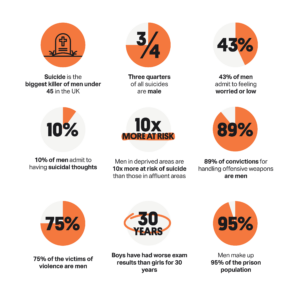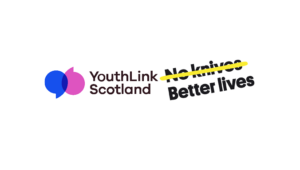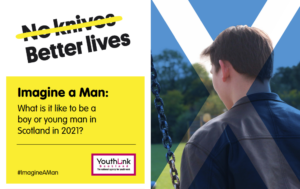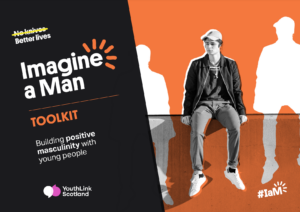We worked with No Knives, Better Lives to produce Imagine a Man – a research project exploring what it is like to be a boy or young man in Scotland. Part of a wider youth-led research initiative exploring positive masculinity, Imagine a Man now includes an in-depth toolkit filled with practitioner resources.

Talking about positive masculinity promotes healthier gender norms and create a more equitable and inclusive society. Positive masculinity benefits everyone. That’s why in 2021, No Knives, Better Lives explored what it was like to be a boy or young man in Scotland today – the result of this was a ground-breaking research project: Imagine a Man.
The purpose of Imagine a Man (IaM) was to develop and deepen our understanding of how young people felt about masculinity and growing up, and whether there was early evidence of the impact of cultural and social norms around masculinity on risk taking and violent behaviour. As a result of this research we started to use the term positive masculinity.
Throughout 2022, we worked with three youth groups (Royston Youth Action in Glasgow, OPEN Project in Shetland, and a collaboration between education, health and police in Dundee) to further explore the term positive masculinity in more depth through youth-led research. The young researchers found that most people they spoke to had not heard about positive masculinity, but had heard about ‘toxic’ masculinity. They identified a need to ‘flip the script’, to change the narrative, to give young men hope and ideas about what they can aspire to be, instead on focusing on what they shouldn’t be.
Men are failing to flourish. If we examine the evidence around men’s mental health, attainment levels and suicide rates we can see that men are doing badly. For a long time, we have known that harmful masculinity has been a driver of violence. Men are far more likely to be both the victims and perpetrators of violent acts, including knife crimes. Men have poorer physical and mental health than women and poorer overall outcomes. Where masculinity intersects with poverty these outcomes are even worse.

No Knives Better Lives, as part of YouthLink Scotland advocates using a youth work approach. This doesn’t mean that you have to be a formally trained youth worker, but we do expect that you would be guided in your prevention work with young people by the principles of youth work. Learn more about youth work principles on our What is Youth Work page.
The young person takes part voluntarily. They choose to be involved, not least because they want to relax, meet friends and have fun. The young person decides whether to engage or to walk away.
Youth work meets young people where they are at. The young person’s life experience is respected and forms the basis for shaping any agenda and development plan in partnership with peers and youth workers.
Youth work is an equal partnership. The young person is recognised as an active partner who can, and should, have opportunities and resources to shape their lives. The relationship and dialogue between the young person and youth worker is central to the learning process.
The following resources are available to help you explore positive masculinity and using a youth work approach to develop activities and programmes that build positive masculinity with young people.



If you're interested in hearing more about Imagine a Man or any other youth-led research projects contact our Senior Policy and Research Officer Dr Amy Calder.